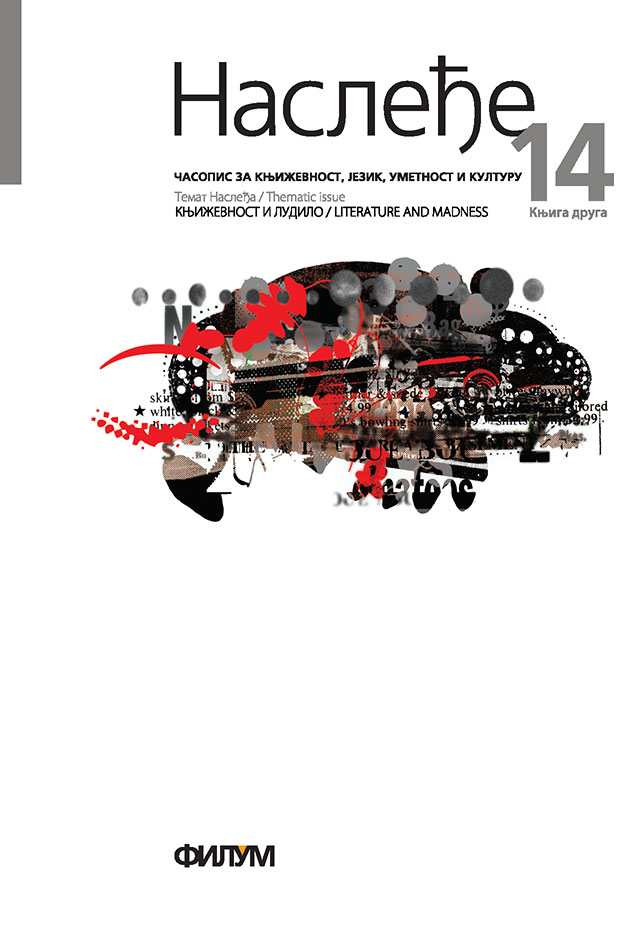PANOPTICONS AND BELL JARS
Keywords:
друштвено уређење, стабилност, контрола, репресија, конформитет, криза идентитета, изопштавањеAbstract
This paper compares the use of madness as means of control (and resistance) in the following novels: Brave New World by Aldous Huxley, Bell Jar by Sylvia Plath, Mrs Dalloway by Virginia Wolf and One Flew Over the Cuckoo’ s Nest by Ken Kesey. The main excuse for the excommunication of the maladjusted in these works is insanity. In order to preserve social stability the system must exterminate all dangerous individuals that are not easily subjected to conformity. If one is not easily subjected, if one is maladjusted, he or she is considered mad, and thus removed so as not to destabilize or endanger others. This paper uses Huxley’ s study of repressive tolerance in the Brave New World as a framing device and key reference point due to the ingenuity with which this novel portrays both strategies of manipulation and drives and motivations for resistance, which the later works by Wolf, Plath and Kesey pick up and elaborate. The theoretical frame for this analysis is provided by Michael Foucault’ s studies of madness and the published clinical experiences of Alice Miller, especially her study For your own good, Hidden cruelity in childrearing and the roots of violence.
References
2. Фуко, Мишел, Историја лудила у доба класицизма, превод Јелена Стакић, Нолит, Београд, 1980.
3. Фуко, Мишел, Надзирати и кажњавати, превод Ана А. Јовановић, Издавачка књижарница Зорана Стојановића Сремски Карловци, Нови Сад, 1997.
4. Фуко, Мишел, „Опасна индивидуа“, превод Татјана Поповић, http://www.zenskestudie.edu.yu/index.php?option=com_content&task=view&id=201, 24 . 12 . 2008.
5. Хајдегер, Мартин, шумски путеви, превод Божидар Зец, Плато, Београд, 2000.
6. Хаксли, Олдос, Дивни нови свијет, превод Влада Стојиљковић, Аугуст Цесарец, Загреб, Свијетлост, Сарајево, 1980.
7. Huxley, Aldous, Есеји, превод Давор Сламинг, Аугуст Цесарец, Загреб, Свијетлост, Сарајево, 1980.
8. Huxley, Aldous, Brave new world and brave new world revisited, Harper Perennial, New York, 2005.
9. Karl, Frederick R., Leo Hamalian, The naked i, Fictions for the seventies, Fawcett World Library, New York, 1971.
10. Кејси, Кен, Лет изнад кукавичјег гнезда, превод Драган Никетић,Моно и Манана, Нови Сад, 2004.
11. Кејси, Кен, „lsdpart2-youtube“, http://www.youtube.com/watch?v=hve1Nr5cCUE&NR=1, 05. 09. 2009.
12. Кејси, Кејн, http://www.youtube.com/watch?v=ZqprTDi4kkc&feature=related.
13. Кesey, Ken, One Flew Over the Cuckoo’s Nest, Picador, London, 1973.
14. Куртис, Адам, The century of the self, http://video.google.com/videoplay?docid=-678466363224520614&hl=en.
15. Miller, Аlice, For your own good, Hidden cruelity in child-rearing and the roots of violence, http://www.nospank.net/fyog.htm, 05. 09. 2009.
16. Плат, Силвија, Стаклено звоно, превод Бранко Вучићевић, Нолит Београд, 1976.






